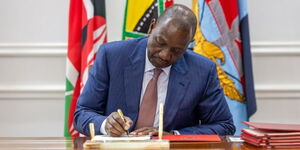Three major issues have been raised against the Independent Electoral and Boundaries Commission (IEBC) in a petition filed in the Supreme Court Challenging President Uhuru Kenyatta’s re-election.
A supporting affidavit by activist Njonjo Mue first pointed out IEBC’s failure to address a memo written by Chairman Wafula Chebukati to CEO Ezra Chiloba.
Mue argued that the electoral commission did not address the memo which raised twelve issues including the creation of a username and password under Chebukati’s name without his consent, before conducting a fresh presidential election on October 26.
He noted that IEBC's failure to publish Chiloba’s response to Chebukati despite assurances that queries raised had been addressed shows the commission did not conduct the election in accordance with the law.
Mue further pointed out the resignation of Roselyne Akombe ahead of the repeat poll stating that the repeat election as planned could not meet the basic expectations of credibility and fairness.
[caption caption="Activist Njonjo Mue"] [/caption]
[/caption]
“The resignation of Commissioner Akombe was occasioned by serious issues she raised that apparently indicated the imminent risk that the scheduled fresh presidential election would not satisfy the legal and constitutional standard of conducting an election,” the affidavit read in part.
Mue further pointed out Chebukati's move to admit that he could not deliver a credible poll citing division among IEBC commissioners.
The affidavit was filed in support of a petition filed by Muslims for Human Rights Chairperson Khelef Khalifa challenging the legitimacy of the election due to the withdrawal of National Super Alliance (NASA) leader Raila Odinga.
The Supreme Court has also received two other petitions filed by former Kilome MP, Harun Mwau, and another by Institute for Democratic Governance.
On Wednesday, Chief Justice David Maraga instructed all respondents in the cases to file their responses by Sunday, November 12 at 5 pm.
[caption caption="Chief Justice David Maraga"] [/caption]
[/caption]












